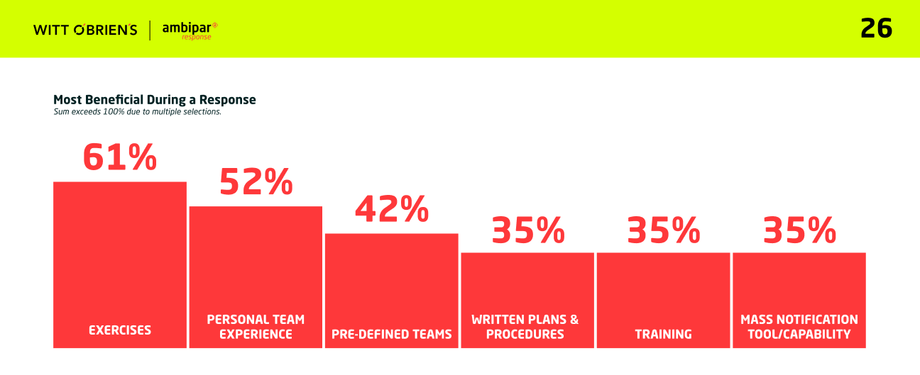Author: Austin Cruz, Sr. Business Resilience Consultant & Cheyene Marling, Managing Director, Talent Management & Research Analytics
The impacts of this past year’s crises have been profound, dominating headlines and leaving a trail of devastation in their wake. High-impact disruptions have ranged from global supply chain disturbances, the increasing prevalence of cyber-attacks, severe weather emergencies, geopolitical conflict, a billion-dollar airline meltdown, a pandemic, and the most consequential financial crisis since the Great Recession that’s still potentially unfolding; there is no shortage of precarious events in today’s crisis-laden environment.
The aftershocks of an organizational crisis have repercussions that can result in widespread job losses, declining stock value, instability, and in the worst cases, complete business closures. Successful businesses can display fortitude in the face of disruption by better understanding what makes organizations resilient. Soon, Witt O’Brien’s (an Ambipar company) will be releasing cutting-edge research analysis with the Event Impact Management Report, 10th Edition, that will give insight into just that.
Research Spotlight:
This industry-leading research focuses on how different crises affect companies on issues ranging from organizational losses, unplanned downtime, impact to employees, and even estimated financial losses. The Report will provide valuable information and analytics into how organizations best prepare for and respond to business disruptions. Survey respondents who acknowledged having been through an actual crisis were asked, “Of all your available plans and resources, what proved to be the Top 3 most beneficial during the response.” Here is how the diverse group of resiliency[AC1] professionals responded:

What the Data Tells Us:
It comes as no surprise that the experience of participating in tabletop exercises (61%) came in as the major front-runner for the most valuable crisis response resource. Here are a few of the many benefits exercises can add to a company, organization, or program:
- Give leaders and decision-makers a chance to work through challenges as a team
- Test and refine written plans, protocols, and procedures
- Allow for opportunities to practice crisis response in safe, no-fault environments
- Are risk-driven and help prepare for the world’s most relevant threats
- Build team cohesion through confidence-building, learning, and continuous improvement
Personal team experience (52%) also topped the charts and can help leaders understand how working as a united team during a crisis response differs from day-to-day roles and collaboration. This experience can be bolstered via training (35%), exercises, or actual crisis management experience. Former President Eisenhower and 5 Star General of the Army observed that:
“In preparing for battle I have always found that plans are useless, but planning is indispensable.” – Dwight D. Eisenhower
While we would disagree with the sentiment that plans are useless, we firmly agree with the importance that respondents identified in selecting written plans and procedures (35%) in their top choices. Eisenhower’s quote stands as a reminder for organizations to ensure that plans don’t get left on the shelf during a crisis by maximizing their value through:
- Refining plans using drills and exercises
- Training on crisis roles and responsibilities
- And making them actionable during a crisis or emergency
Having pre-defined teams (42%) is pivotal, particularly to ensuring that all the key decision-makers are alerted and involved in a crisis response from its onset. When selecting a crisis management team, there’s a balance between having so many people at the table that decision-making is impeded and not having the right people with the knowledge, skills, and experience necessary to address a specific challenge. Determining who is involved in a crisis response is a dynamic issue and one that’s best explored prior to a crisis occurring.
While mass notification capabilities (35%) play an invaluable role in some crises, particularly those with life safety impacts, it makes sense that only about a third of respondents listed it in their top-most beneficial resources. While sending mass notifications to alert people of an imminent weather emergency can save lives and enable employees to be accounted for, it may not have the same value during a reputational or product failure-related crisis. It’s also paramount that users of these tools be well-trained and equipped to rapidly deploy these systems in an emergency while also ensuring that the proper safeguards are installed to prevent accidental deployments.
Upcoming Event Impact Management Report:
If the opportunity to explore 50 pages of content intertwined with research, analytics, and insight from top international industry experts is of interest to you, follow Witt O’Brien’s on LinkedIn to learn when it’s published. As an expression of gratitude for those participating in the confidential data collection survey, they will receive a customized BCM Event Management Peer Data Dashboard tailored to their industry or organizational revenues. The survey will remain open until August 30, 2023. Stay safe.
Please contact Cheyene to learn more about the upcoming Event Impact Management Report or Austin for additional information on how your business can become more resilient to crisis, disasters, and other business disruptions.
[1] 153 survey respondents from professions such as resilience management, business continuity, disaster recovery, risk management, emergency/crisis management, and security responded.

About Austin Cruz
Austin Cruz is a Senior Business Resilience Consultant with Witt O’Brien’s (an Ambipar company) Corporate Resilience Division. He specializes in crisis management, business continuity, and emergency planning across technology, finance, aerospace/defense, and manufacturing professions. He currently sits on the USA Chapter Board of the Business Continuity Institute through their Future Leader Program, where he chairs the Membership Engagement Collaboration Stream. He has expansive volunteer experience across the non-profit disaster response sector, including multiple deployments and a leadership role with Team Rubicon. Austin graduated from the University of Texas and the LBJ School of Public Affairs, where he studied global crisis management and disaster response.

Cheyene is a global leader with over 20 years dedicated expertise specializing in the business continuity profession. She founded BC Management, Inc. in 2000 and joined Witt O’Brien’s in 2022 as a Managing Director, Talent Management & Research Analytics. Within Witt O’Brien’s (an Ambipar company) she is responsible for overseeing staffing strategies and data research analytics for global clients in addition to providing career assessments and coaching expertise. She previously served on the board for the Association of Continuity Professionals (ACP) of Los Angeles and Orange County in addition to the National Board for the ACP. Currently, she is an active professional on the Editorial Advisory Board for Continuity Insights and the DRJ Mentor Advisory Board. Cheyene was also the recipient of the inaugural ACP Hall of Fame award in 2006 and in 2010 she was awarded an Honorary MBCI by the Business Continuity Institute (BCI).